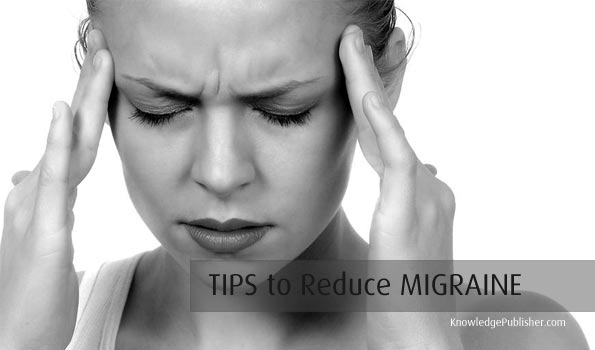Migraine Headache - Causes, Symptoms, Diagnosis and Treatment
Migraine Headaches
A migraine is a very painful type of headache. People who get migraines often describe the pain as pulsing or throbbing in one area of the head. During migraines, people are very sensitive to light and sound. They may also become nauseated and vomit.
Migraine is three times more common in women than in men. Some people can tell when they are about to have a migraine because they see flashing lights or zigzag lines or they temporarily lose their vision.

Many things can trigger a migraine. These include:
-
Anxiety
-
Stress
-
Lack of food or sleep
-
Exposure to light
-
Hormonal changes (in women)
Doctors used to believe migraines were linked to the opening and narrowing of blood vessels in the head. Now they believe the cause is related to genes that control the activity of some brain cells. Medicines can help prevent migraine attacks or help relieve symptoms of attacks when they happen. For many people, treatments to relieve stress can also help.
Migraine Treatment
Although there is no cure, migraine is treatable with your help and proper medical care. To control the effect that migraine has on your life, you and your doctor can work together to develop an individual treatment plan that:
-
Identifies and controls triggers that start a migraine.
-
Uses medications to prevent and treat migraine attacks.
-
Encourages healthy behavior and lifestyle changes.
To give you the best chance for success, you and your doctor must work as a team. A diary is a valuable tool. It can help identify migraine triggers and track how drugs are working. It can also track the results of treatment and lifestyle changes. Regular follow-up visits and proper drug use are also vital.
Migraine Triggers
Many people know and can avoid their migraine triggers, which may include:
-
Diet : Missed meals, alcohol (especially red wine), foods with monosodium glutamate (MSG), excessive caffeine, preserved meats with nitrates and nitrites, and foods that contain tyramine- such as aged cheeses- may trigger migraine.
-
Sleep : Too much or too little sleep can trigger a migraine attack.
-
Stress : Stress and release from stress may be a factor in triggering migraine.
-
Environmental factors : Weather change, glaring or fluorescent lights, strong odors, and high altitude can trigger migraine.
Hormonal changes
Many women have attacks linked to their menstrual cycles. Menstrual migraines can be more severe than other migraines. They can also be more difficult to treat. Migraine often changes during pregnancy. Women usually have fewer migraines as they age.
Medication
Acute treatments are used to stop an attack when it occurs or to treat its symptoms. If you have frequent attacks, you can take a preventive treatment. This can help migraines strike less often and end sooner. However, daily use of a headache medication may make your headaches worse.
Acute treatments
Pain-relieving drugs include:
-
Nonprescription (over-the-counter) medications, such as aspirin, ibuprofen, or acetaminophen combined with aspirin and caffeine.
-
Prescription nonsteroidal anti-inflammatory drugs and analgesics, including narcotics and non-narcotics
Specific drugs used to stop migraine attacks include:
-
Triptans, such as sumatriptan, zolmitriptan, naratriptan, and rizatriptan
-
Ergot alkaloids, such as dihydroergotamine
Drugs used in hospital emergency rooms include:
- Dihydroergotamine, antiemetics (anti-nausea drugs), narcotic and non-narcotic analgesics
Preventive treatments
Daily preventive medications are also available for people with frequent, debilitating headaches. They can also help if your treatment is not working or is causing side effects. Although these drugs may not prevent all migraines, they can reduce the frequency, pain, and length of attacks.
Preventive treatments include:
-
Antidepressants, such as amitriptyline
-
Beta-blockers, such as propranolol or timolol
-
Calcium channel blockers, such as verapamil
-
Anticonvulsants, such as divalproex sodium
-
Alternative treatments, such as vitamin B2, magnesium, and feverfew
Contact your doctor if your treatment is not working as well or if you need to use more acute medication. Overuse of acute drugs can lead to daily rebound headache.
Cognitive and Behavioral Treatments
Research has shown that some cognitive and behavioral treatments can help prevent migraine. These include:
-
Relaxation training
-
Thermal biofeedback with relaxation training
-
Electromyographic biofeedback
-
Cognitive-behavioral therapy (also called stress-management training)
Guidelines
Guidelines for doctors on the diagnosis, treatment, and prevention of migraine were developed by the US Headache Consortium, a group of migraine experts. The guidelines are available at www.aan.com.
Progress through Research
Research into the causes and treatments of migraine has led to many exciting discoveries. These may result in more prevention and treatment options. The next generation of triptan drugs has arrived; newer drugs are in testing. There is hope for those who cannot take or do not respond to current drugs.
You may find taking part in clinical research trials to be rewarding. Benefits include taking a more active role in your health care and gaining access to expert medical care.
Migraine Prevention: A Guide to the Latest Methods and Treatments (additional information)
Article Source : http://www.nlm.nih.gov/medlineplus/migraine.html
Disclaimer : Our goal is to provide you with information that may be useful in attaining optimal health. Nothing in it is meant as a prescription or as medical advice. The information provided herein should not be used during any medical emergency or for the diagnosis or treatment of any medical condition. A licensed physician should be consulted for diagnosis and treatment of any and all medical conditions.